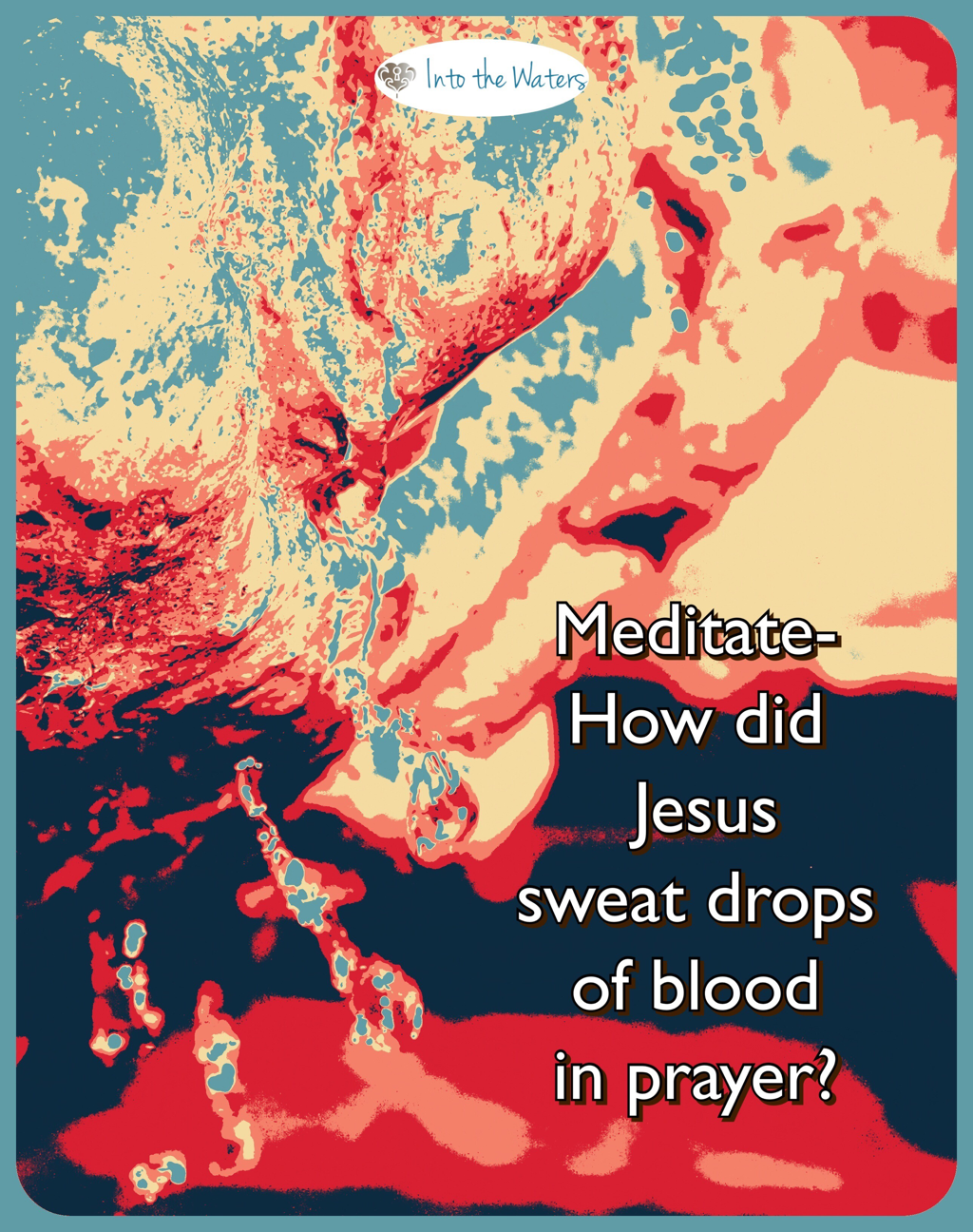|
Read detail below on the medical condition Jesus experienced that caused him to sweat blood. Ponder if you have ever experienced in just a small way Jesus’ extreme distress.
Have you ever broken a sweat in prayer? Probably not, and even more unlikely you ever sweat blood in prayer. But Jesus has, look up Luke 22:44 on Google. The reference from the book of Luke was written by a disciple named Luke who was a doctor. His account of Jesus alone states that Jesus’ sweat was like drops of blood, falling to the ground when he prayed about what was about to happen to Him. There are 3 other books (Matthew, Mark, and John) with accounts of Jesus praying before his suffering, with Matthew and Mark also referencing his severe anguish. He himself said that his soul was overwhelmed to the point of death. All accounts describe what a severe panic attack would look like, someone under traumatic internal distress. If you look more closely at what Jesus was experiencing in the garden of Gethsemane, you will see the extreme mental and emotional pressure overwhelming him. To assist with this, I've included some detail from a renowned chief medical examiner and forensic pathologist, Dr. Frederick Zugibe. He detailed what it takes for a human being to sweat blood in his book “The Crucifixion of Jesus”. Here are some summarized excerpts and other thoughts to ponder- • There is a rare medical condition called Hematidrosis which is defined in Stedman’s medical dictionary as excretion of blood or blood pigments in the sweat. • It is associated with a severe anxiety reaction triggered by fear. • One study of 76 cases showed individuals experienced extreme psychogenic factors of acute fear and mental distress as precipitating reasons for hematidrosis. • It is a reaction from the nervous system’s “fight or flight” response. How can we know Jesus wanted to “flee” what was about to happen to him? Consider Jesus’ prayer of, “My Father, if it is possible, may this cup be taken from me, yet not as I will but as you will.” • In a threatening situation, the body responds with the “fight or flight” reaction via the sympathetic nervous system. Pupils dilate, heart rate increases, sweat glands activate, blood vessels constrict to raise blood pressure, blood is diverted away from the skin to the brain and muscles for focus and rapid response, blood sugar is released to provide additional energy. • In a threatening situation, it is not just the physical body alerted but also the psychological systems of the body. Specifically, the amygdala, which is the fear center of the brain. When the emotional center is reacting, a person experiences breathlessness, a choking sensation, heart palpitations, muscle tension, chest tightness, trembling, sweating, pallor, and overwhelming feelings of acute panic, as if having a heart attack. • Combine the physical and psychological symptoms and you have what Jesus was experiencing when he says his soul was overwhelmed to the point of death. It explains why he fell to the ground in prayer, falling to his face, emptied of strength. Dr. Zugibe states that Jews normally stood to pray as a sign of honor to God, so it is important to note the Gospels detail Jesus falling to the ground while in prayer. He says it is detail to support the extreme distress Jesus was experiencing. • Dr. Zugibe also explains in detail the tiny blood vessels that surround 2 million sweat glands in the skin. He explains how the blood would have been diverted from the glands during Jesus’ mental and emotional trauma, but how the blood would have rushed back to the delicate capillaries that surround the sweat glands when the angel came and strengthened Jesus, Luke 22:43. Yet Jesus was still in anguish, even after being strengthened, and he prayed more earnestly. It is at this point Luke notes that Jesus’ sweat was like drops of blood falling to the ground. • Dr. Zugibe summarizes Jesus distress in the garden of Gethsemane by stating the following, “The severe mental anxiety due to a profound fear of his prescient sufferings stimulated the fear center of the brain (amygdala), which sent out a general alarm to all centers of the brain, invoking a full scale fight or flight reaction. This reaction lasted for hours resulting in a total state of exhaustion, only to end abruptly in a severe counter reaction after the angel came and ministered to him, and he accepted his fate. This caused severe dilation and rupture of the blood vessels into the sweat glands, causing hemorrhage into the ducts of the sweat glands, and the subsequent extrusion onto the skin, exactly as St. Luke described it.” • A Good Shepherd lays down his life for the sheep. Jesus clearly says He is the Good Shepherd who dies for his sheep, John 10:11. What does his suffering mean to you? • Take time to see in your mind’s eye Jesus’ praying in extreme distress in the Garden of Gethsemane. Let yourself feel some of his panic and sense how He would feel overwhelmed to the point of death. See the tremendous cost the Good Shepherd contemplated as He wrestled with His fate to die for the sheep, for all who would call on His Name. • “If there is any other way”, Jesus vulnerably prays, “please take this cup from me, yet not what I will but what you will Father.” • This reading is a pre-cursor to tomorrow’s meditation that will be posted on Into the Waters’ Facebook page. The focus is on Jesus calming our circumstantial fears and crippling thoughts. Those are the 2nd and 3rd of 4 fears that the Good Shepherd alone can calm. The first one was relational upset, and it was the focus of last Friday’s meditation. Please visit Into the Waters Facebook page and listen to it. And tomorrow’s meditation will be about circumstantial fears and mental attack you imagine threaten your livelihood. Praying you carve out quiet time with the Good Shepherd!
0 Comments
Your comment will be posted after it is approved.
Leave a Reply. |
Ways to stay connected to ministry offerings:
1- Sign up to receive blog and email announcements 2- Search on Facebook and join our private Facebook group> Peace Be Still Daily Prayer Download Categories
All
Archives
March 2024
|


 RSS Feed
RSS Feed
